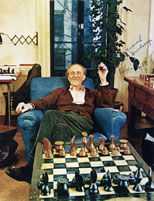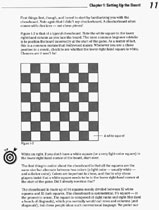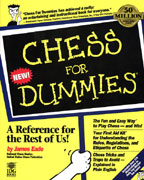Duchamp as Trickster
by Steven B. Gerrard
|
Click
to enlarge
|
|
Photograph
of Duchamp sitting in front of a chess set designed by Max Ernst,
1968
© 2000 Succession Marcel Duchamp ARS, N.Y./ADAGP, Paris. |
|
Click
to enlarge
|
|
The
white square needs to be in the lower right-hand corner. Seen in
James Eade, Chess for Dummies, 1996, p. 11
|
|
Cover
for the "Chess for Dummies," by James Eade, IDG Books Worldwide,
Inc., 1996
|
In the accompanying photograph of Duchamp sitting in front of a Max Ernst designed chess set, the master chess player Duchamp has the board set up with a dark square in the lower right corner! (The proper setup is to always have a light square in that corner.) Following the theme of the articles in the first issue of this journal, Duchamp seems to always both 1) deceive, yet 2) leave clues of his deception. (Of course, a deception a without a clue would be hard to uncover.)
As a personal note, most of my previous scholarly work has been on Wittgenstein's philosophy of mathematics. I have just begun an investigation of the confluences between Duchamp's readymades and Wittgenstein's conception of ordinary language. For the moment, I have a title -- "Still Life with Wittgenstein and Duchamp" -- and some hints. Consider the following sample from remark 129 of Wittgenstein's Philosophical Investigations:
"The aspects of things that are most important for us are hidden because of their simplicity and familiarity. (One is unable to notice something -- because it is always before one's eyes.) [...] we fail to be struck by what, once seen, is most striking and most powerful."Chess should play an illuminating and complicating role, as in this passage from Wittgenstein's Blue Book (p. 65): "I want to play chess, and a man gives the white king a paper crown, leaving the use of the pieces unaltered, but telling me that the crown has a meaning to him in the game, which he can't express by rules. I say: 'as long as it doesn't alter the use the piece, it hasn't what I call a meaning'.'"
I hope to report further
in a future issue of Tout-Fait. Fellow investigators are welcome to contact
me at Steven.B.Gerrard@williams.edu.
[José Antônio Fabiano Mendes Rio de Janeiro, Brazil, informs Tout-Fait's
readers that 39 chess games played by Marcel Duchamp can be retrieved
at http://www.chesslab.com/positionsearch.html
Date range: select Historical archive(1485-1990)]
| |
|
|
|
|
|
|
|
|
onMouseOver="document.images['Link10'].src='../images/Bar1_03_09_over.gif';"
onMouseOut="document.images['Link10'].src='../images/Bar1_03_09.gif';">
 |


